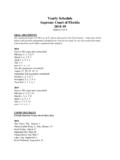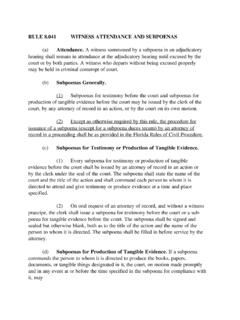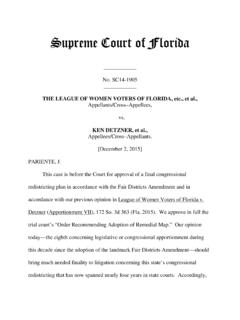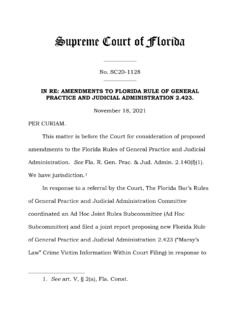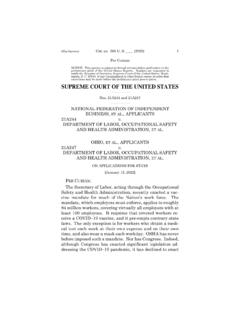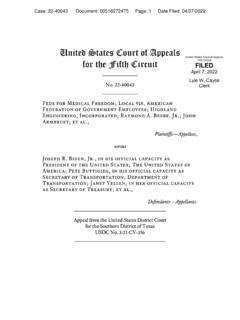Transcription of Supreme Court of Florida
1 Supreme Court of Florida _____ No. SC20-1490 _____ IN RE: AMENDMENTS TO Florida RULE OF CIVIL PROCEDURE December 31, 2020 PER CURIAM. The Court , on its own motion, amends Florida Rule of Civil Procedure (Summary Judgment).1 Effective May 1, 2021, the amended rule adopts the summary judgment standard articulated by the United States Supreme Court in Celotex Corp. v. Catrett, 477 317 (1986); Anderson v. Liberty Lobby, Inc., 477 242 (1986); and Matsushita Electric Industrial Co. v. Zenith Radio Corp., 475 574 (1986) (together, the federal summary judgment standard ).
2 Through this amendment, we align Florida s summary judgment standard with that of the federal courts and of the supermajority of states that have already adopted the federal summary judgment standard. See Zachary D. Clopton, Procedural 1. We have jurisdiction. See art. V, 2(a), Fla. Const.; Fla. R. Jud. Admin (d). - 2 - Retrenchment and the States, 106 Calif. L. Rev. 411, 432 (2018) (identifying thirty-seven states as having adopted the federal standard in whole or in part; since then a thirty-eighth state (Utah) has embraced the federal standard). The Florida and federal rules of civil procedure share the same overarching purpose: to secure the just, speedy, and inexpensive determination of every action.
3 Fla. R. Civ. P. ; cf. Fed. R. Civ. P. 1. Moreover, as a purely textual matter, the critical sentences in Florida s summary judgment rule and in the federal summary judgment rule are materially indistinguishable. Specifically, Florida s rule (c) requires summary judgment where the record shows that there is no genuine issue as to any material fact and that the moving party is entitled to a judgment as a matter of law. Federal Rule of Civil Procedure 56(a), in turn, requires summary judgment if the movant shows that there is no genuine dispute as to any material fact and the movant is entitled to judgment as a matter of law.
4 Despite this consistency of purpose and text, Florida and federal courts have not been aligned in their summary judgment jurisprudence. Three particularly consequential differences stand out. (The following explains these key differences; the discussion is not intended to limit the scope of the rule amendment that we adopt today.) First, Florida courts [have] repeatedly declined to recognize the fundamental similarity between a motion for directed verdict and a motion for - 3 - summary judgment. Thomas Logue & Javier Alberto Soto, Florida Should Adopt the Celotex Standard for Summary Judgment, 76 Fla.
5 Bar J. Feb. 2002, at 20, 22. By contrast, the Supreme Court has held that the federal summary judgment standard mirrors the standard for a directed verdict. Anderson, 477 at 250. Although it recognized that there are procedural differences in the two motions (one is made before trial and the other during trial), the Supreme Court concluded that the inquiry under each is the same: whether the evidence presents a sufficient disagreement to require submission to a jury or whether it is so one-sided that one party must prevail as a matter of law. Id. at 251-52. Second, since this Court s decision in Holl v.
6 Talcott, 191 So. 2d 40 (Fla. 1966), Florida courts have required the moving party conclusively to disprove the nonmovant s theory of the case in order to eliminate any issue of fact. Logue & Soto, supra, at 24. By contrast, the Supreme Court has held that there is no express or implied requirement in Rule 56 that the moving party support its motion with affidavits or other similar materials negating the opponent s claim. Celotex, 477 at 323. Rather, the Supreme Court explained that the burden on the moving party may be discharged by showing that is, pointing out to the district Court that there is an absence of evidence to support the nonmoving party s case.
7 Id. at 325. Upon motion and provided there has been an adequate time for discovery, the Supreme Court has held that summary judgment should be entered - 4 - against a party who fails to make a showing sufficient to establish the existence of an element essential to that party s case, and on which that party will bear the burden of proof at trial. Id. at 322. In other words, under the federal summary judgment standard, the extent of the moving party s burden varies depending on who bears the burden of persuasion at trial. Salo v. Tyler, 417 P. 3d 581, 587 (Utah 2018). Third, Florida courts have adopted an expansive understanding of what constitutes a genuine ( , triable) issue of material fact.
8 While the caselaw is not entirely uniform, a leading treatise characterizes the Florida standard this way: [T]he existence of any competent evidence creating an issue of fact, however credible or incredible, substantial or trivial, stops the inquiry and precludes summary judgment, so long as the slightest doubt is raised. Bruce J. Berman & Peter D. Webster, Berman s Florida Civil Procedure :5 (2020 ed.). By contrast, the Supreme Court has described the federal test as whether the evidence is such that a reasonable jury could return a verdict for the nonmoving party. Anderson, 477 at 248.
9 If the evidence is merely colorable, or is not significantly probative, summary judgment may be granted. Id. at 249-50 (citations omitted). A party opposing summary judgment must do more than simply show that there is some metaphysical doubt as to the material facts. Matsushita, 475 at 586. More recently, the Supreme Court explained that - 5 - [w]hen opposing parties tell two different stories, one of which is blatantly contradicted by the record, so that no reasonable jury could believe it, a Court should not adopt that version of the facts for purposes of ruling on a motion for summary judgment.
10 Scott v. Harris, 550 372, 380 (2007). In Wilsonart, LLC v. Lopez, No. SC19-1336, 2019 WL 5188546, at *1 (Fla. Oct. 15, 2019), we invited the parties to brief the question whether Florida should adopt the federal summary judgment standard. In addition to the Wilsonart parties submissions, we heard from numerous amici, who as a group articulated a range of perspectives from Florida s legal and business communities. What we learned in Wilsonart supplemented our own views and experience dealing with this issue, which has long been the subject of thoughtful commentary. See, , Logue & Soto, supra (advocating that Florida adopt the federal summary judgment standard); Leonard D.
